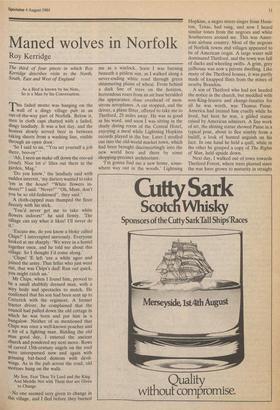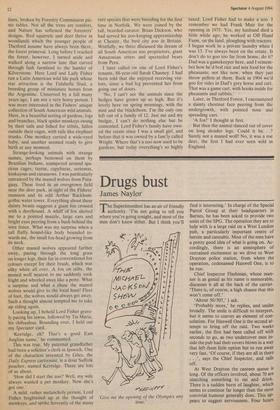Maned wolves in Norfolk
Roy Kerridge
The third of four pieces in which Roy Kerridge describes visits to the North, South, East and West of England
As a Bird is known by his Note, So is a Man by his Conversation.
This faded motto was hanging on the wall of a dingy village pub in an out-of-the-way part of Norfolk. Below it, men in cloth caps chatted with a faded, dingy landlady. It was a hot day, and the hostess slowly served beer in between taking sheets from a washing line, visible through an open door.
`So I said to un, "You set yourself a job there, boo-oy".'
`Ah, I seen un make off down the roo-ud (road). Nice lot o' lilies out there in the garden, Mag.'
`Do you know,' the landlady said with sudden interest, 'my darters wanted to take 'em in the house! "White flowers in- doors?" I said. "Never!" "Oh, Mum, don't you be so old-fashioned", they said.'
A cloth-capped man thumped the floor fiercely with his stick.
`You'd never get me to take white flowers indoors!" he said firmly. 'The village can say what it likes! I'll never do it.'
`Excuse me, do you know a bloke called Chips?' I interrupted nervously. Everyone looked at me sharply. 'We were in a hostel together once, and he told me about this village. So I thought I'd come along.'
`Chips! 'E left 'ere a while agoo and Joined the army. That feller who just went out, that was Chips's dad! Run out quick, You might catch un.'
Mr Chips, when I found him, proved to be a small shabbily dressed man, with a Wiry body and spectacles to match. He confirmed that his son had been sent up to Catterick with the regiment. A former tractor driver, he complained that the council had pulled down the old cottage in which he was born and put him in a bungalow. Neither of us mentioned that Chips was once a well-known poacher and a bit of a fighting man. Bidding the old man good day, I entered the ancient church and pondered my next move. Rows of carved 15th-century angels on the roof were interspersed now and again with grinning bat-faced demons with devil- wrings. As in the pub across the road, old mottoes hung on the walls.
My Son, Fear Thou Ye Lord and the King And Meddle Not with Them that are Given to Change.
No one seemed very given to change in this village, and I fled before they burned me as a warlock. Soon I was burning beneath a pitiless sun, as I walked along a never-ending white road through green shimmering plains of wheat. From behind a dark line of trees on the horizon, horrendous roars from an air base heralded the appearance close overhead of mon- strous aeroplanes. A car stopped, and the driver, a plane fitter, offered to take me to Thetford, 25 miles away. He was as good as his word, and soon I was sitting in the shady dining room of the Central Hotel, enjoying a meal while Lightning Hopkins records played in the bar. Later I strolled out into the old-world market town, which had been brought disconcertingly into the new world here and there by some shopping-precinct architecture.
`I'm gonna find me a new home, some- where way out in the woods,' Lightning Hopkins, a negro street-singer from Hous- ton, Texas, had sung, and now I heard similar tones from the negroes and white Southerners around me. This was Amer- ican airbase country. Most of the negroes of Norfolk towns and villages appeared to be of American origin. A large water mill dominated Thetford, and the town was full of ducks and wheeling swifts. A grim, grey jailhouse was now a private dwelling. Like many of the Thetford houses, it was partly made of knapped flints from the mines of nearby Brandon.
A son of Thetford who had not heeded the notice in the church, but meddled with non-King-fearers and change-fanatics for all he was worth, was Thomas Paine. America had treated him cruelly while he lived, but here he was, a gilded statue raised by American admirers. A fine work of art, the shining statue showed Paine in a typical pose, about to flee nimbly from a bailiff, a look of hunted anguish on his face. In one hand he held a quill, while in the other he grasped a copy of The Rights of Man, held upside down.
Next day, I walked out of town towards Thetford Forest, where trees planted since the war have grown to maturity in straight lines, broken by Forestry Commission pic- nic tables. Not all the trees are conifers, and Nature has softened the foresters' designs. Red squirrels and deer thrive in woodlands which the younger people of Thetford assume have always been there, the forest primeval. Long before I reached the forest, however, I turned aside and walked along a narrow lane that curved through lush farmland to the hamlet of Kilverstone. Here Lord and Lady Fisher run a Latin American wild life park whose star attraction is the Falabella Stud, a breeding group of miniature horses from the Argentine. Unnerved by a fall many years ago, I am not a very horsy person. I was more interested in the Fishers' unique collection of South American wild animals. Here, in a beautiful setting of gardens, logs and branches, black spider monkeys swung by their tails and fished for titbits, fallen outside their cages, with tails like elephant trunks. One monkey carried a wide-eyed baby, and another seemed ready to give birth at any moment.
Strange-looking animals with strange names, perhaps bestowed on them by Brazilian Indians, scampered around spa- cious cages; tayras, capybaras, seriemas, kinkajous and curassows. I was particularly entranced by the maned wolves from Para- guay. These lived in an overgrown field near the deer park, in sight of the Fishers' mansion and its odd Arthur Rackham- gothic water tower. Everything about these dainty beasts suggests a giant fox crossed with a deerhound. A whiff of fox alerted me to a pointed muzzle, large ears and bright eyes peering from a bush behind the wire fence. What was my surprise when a tall fluffy hound-like body bounded to- wards me, the small fox-head growing from its neck.
Other maned wolves appeared farther away, pacing through the long grass on longer legs, their fur in conventional fox colours except for their brush, which was silky white all over. A fox on stilts, the maned wolf nearest to me suddenly took fright and wheeled away like a pony. What a surprise and what a chase the maned wolves would give to the local hunt! Fleet of foot, the wolves would always get away. Such a thought almost tempted me to take up riding again.
Looking up, I beheld Lord Fisher grave- ly pacing his lawns, followed by Tia Maria, his chihuahua. Bounding over, I held out my Spectator card.
'Kerridge, eh? That's a good East Anglian name,' he commented.
This was true. My paternal grandfather had been a solicitor's clerk in Ipswich. One of the characters invented by Giles, the Daily Express cartoonist, is a dour Suffolk poacher, named Kerridge. There are lots of us about.
`How did I start the zoo? Well, my wife always wanted a pet monkey. Now she's got one.' A mild, rather melancholy person, Lord Fisher brightened up at the thought of monkeys, and spoke fervently of the many rare species that were breeding for the first time in Norfolk. We were joined by the tall, bearded curator. Brian Dickson, who had served his zoo-keeping apprenticeship at Chester, the best city zoo in Britain. Wistfully, we three dfscussed the dream of all South American zoo proprietors, giant Amazonian otters and spectacled bears from Peru.
I later called on one of Lord Fisher's tenants, 88-year-old Sarah Chasney. I had been told that she enjoyed receiving visi- tors, since a bad leg prevented her from going out of doors.
'No, I can't see the animals since the hedges have grown up so high. But it's lovely here on spring mornings, with the mist and the blackthorn. I'm the only one left out of a family of 12. Just me and my budgie, I can't do nothing else but be contented. Lord Fisher's family have own- ed the estate since I was a small girl, and before that it was owned by a fain"), called Wright. Where that's a zoo now used to be gardens; but today everything's so highly
taxed, Lord Fisher had to make a zoo. I remember we had Frank Muir for the opening in 1975. Yes, my husband died a little while ago; he worked at Off Hand Farm, on the land, ploughing with tractors.
I began work in a private laundry when I was 13. I've always been on the estate. It don't do to goo too far from home, do it?
Dad was a gamekeeper here, and I remem- ber how he'd boil rice and mix food for the pheasants; not like now, when they just throw pellets at them. Back in 1904 we'd goo for rides in Dad's grey horse and cart. That was a game cart, with hooks inside for pheasants and rabbits.'
Later, in Thetford Forest, I encountered a dainty chestnut face peering from the undergrowth, with pointed nose and spreading ears.
'A fox!' I thought at first.
But then the anima! danced out of cover on long slender legs. Could it be. . .? Surely not a maned wolf! No, it was a roe deer, the first I had ever seen wild in England.







































 Previous page
Previous page